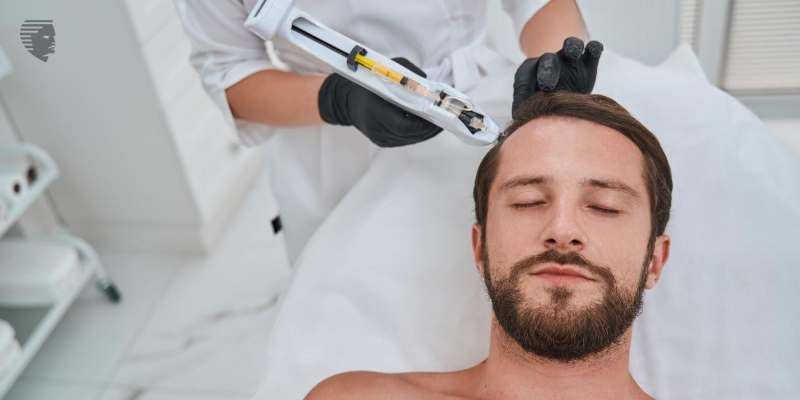Hair Loss Treatment for Men is a common concern for many men, affecting their confidence and self-esteem. Hair loss, also known as alopecia, is a common concern among men of all ages. It can be a distressing experience, affecting one’s physical appearance, self-confidence, and emotional well-being. As a man, it’s essential to understand the underlying causes of hair loss and the various treatment options available to address this issue effectively.
Hair loss in men can be attributed to various factors, including genetics, hormonal imbalances, medical conditions, and lifestyle factors. Understanding the root causes of hair loss is the first step in developing an effective treatment plan.
For a comprehensive understanding of how laser hair treatment works and its benefits, check out our detailed guide on laser hair treatment methods and outcomes.
Causes of Hair Loss in Men:
- Genetic Factors: Male pattern baldness, also known as androgenetic alopecia, is men’s most common type of hair loss. It is inherited and is caused by a sensitivity to the male hormone dihydrotestosterone (DHT), which can cause hair follicles to shrink and eventually stop producing new hair.
- Hormonal Imbalances: Changes in hormone levels, such as an increase in DHT or a decrease in thyroid hormones, can contribute to hair loss in men.
- Stress and Trauma: Significant physical or emotional stress can trigger a type of hair loss called telogen effluvium, which can cause excessive hair shedding.
- Nutritional Deficiencies: A lack of essential nutrients, such as iron, protein, and vitamins, can contribute to hair loss in men.
- Hairstyles and Treatments: Certain hairstyles, such as tight ponytails or braids, and harsh hair treatments, such as chemical dyes and perms, can damage hair and lead to thinning or loss.
Types of Hair Loss in Men:
- Androgenetic Alopecia is the most common type of hair loss in men. A receding hairline and thinning hair on the top and sides of the scalp characterize it.
- Telogen Effluvium: This hair loss is triggered by a stressful event or physical trauma, causing more hair to enter the resting (telogen) phase and fall out.
- Alopecia Areata: This autoimmune condition causes patchy hair loss on the scalp and other parts of the body.
- Traction Alopecia: This hair loss is caused by excessive or prolonged tension on the hair, such as from tight hairstyles or hair extensions.
- Scarring Alopecia: This is a rare type of hair loss caused by an underlying skin condition that damages the hair follicles, leading to permanent hair loss.
The Importance of Early Detection and Treatment:
Early detection and treatment of hair loss are crucial for achieving the best possible outcomes. The sooner you address the issue, the more likely you will slow down or reverse the hair loss process. Delaying treatment can lead to more extensive and permanent hair loss, making it more challenging to achieve satisfactory results.
Common Misconceptions about Hair Loss Treatment:
- Hair loss is more common as we age; it is not a natural or unavoidable process. Many effective treatments are available to address hair loss at any age.
- Some over-the-counter products may provide temporary relief, but prescription-strength treatments are typically more effective in addressing the root causes of hair loss.
- Hair transplants can be an effective long-term solution but are not the only option. Other non-surgical and surgical treatments can also provide lasting results.
- Hair loss is a common issue, and there is no shame in seeking professional help to address it. Discussing your concerns with a dermatologist can lead to the most effective Hair Loss Treatment for Men plan.
Non-Surgical Hair Loss Treatment for Men
- Minoxidil (Rogaine): This topical Hair Loss Treatment for Men is the only over-the-counter medication approved by the FDA for treating male pattern baldness. It works by stimulating hair growth and prolonging the active growth phase of the hair cycle.
- Finasteride: This oral medication is a prescription-strength Hair Loss Treatment for Men that blocks the production of DHT, the primary hormone responsible for male pattern baldness.
- Low-Level Laser Therapy: This non-invasive Hair Loss Treatment for Men uses low-intensity laser or light-emitting diodes (LEDs) to stimulate hair follicles and promote growth.
- Platelet-rich plasma Therapy involves injecting a concentration of the patient’s own platelets into the scalp to stimulate hair growth and improve the health of the hair follicles.
- Nutritional Supplements: Certain vitamins, minerals, and herbs, such as biotin, iron, and saw palmetto, may help support hair health and reduce hair loss.
Surgical Hair Loss Treatment for Men:
- Hair Transplantation: This procedure involves taking healthy, growing hair follicles from one part of the scalp and transplanting them to the areas of the scalp affected by hair loss.
- Scalp Reduction: This surgical technique removes bald areas of the scalp and stretches the remaining hair-bearing skin to cover the balding areas.
- Scalp Expansion: This procedure involves gradually expanding the scalp using tissue expanders, which can then be used to cover bald areas.
Natural Remedies for Hair Loss in Men:
- Herbal Treatments: Certain herbs, such as saw palmetto, pumpkin seed oil, and ginger, have been traditionally used to support hair health and potentially slow down hair loss.
- Essential Oils: Oils like rosemary, lavender, and peppermint have been shown to have potential hair growth-promoting properties when applied topically to the scalp.
- Dietary Changes: Ensuring a balanced diet rich in protein, vitamins, and minerals can help support the overall health of your hair and potentially reduce hair loss.
Role of a Dermatologist:
A dermatologist is a medical professional specializing in diagnosing and treating skin, hair, and nail conditions. They can play a crucial role in your hair loss Hair Loss Treatment for Men journey by:
- Conducting a thorough evaluation to identify the underlying cause of your hair loss
- Recommending the most and adjusting the Hair Loss Treatment for Men plan as necessary
- Providing appropriate Hair Loss Treatment for Men options based on your individual needs
- Monitoring your progress with changes and preventive measures to support hair health
FAQs
How long does it take to see results from hair loss treatment?
The timeline for seeing results can vary depending on the type of Hair Loss Treatment for Men and the individual’s response. Some treatments, such as minoxidil, may show initial results within a few months, while others, like hair transplants, can take several months to a year to see the full effects.
Can hair loss be reversed entirely?
In some cases, yes. Certain types of hair loss, such as telogen effluvium or alopecia areata, can be reversed with the proper treatment. However, in the case of male pattern baldness, hair loss can be slowed or stabilized, but complete reversal may not be possible.
Are there any side effects associated with hair loss treatments?
Most hair loss treatments are generally safe, but some may have potential side effects, such as skin irritation, headaches, or sexual side effects. Before starting any treatment, discussing the possible risks and benefits with your dermatologist is essential.
How often do I need to use hair loss treatments?
The frequency of use depends on the specific treatment. Some, like minoxidil, need to be used daily, while others, like laser therapy or PRP, may require less frequent application or treatments.
Can hair loss be prevented?
While there is no guaranteed way to prevent all types of hair loss, adopting a healthy lifestyle, managing stress, and addressing any underlying medical conditions can help reduce the risk of hair loss or slow its progression.
Conclusion:
Hair loss is a common issue that affects many men, but practical solutions are available with advancements in hair loss treatments and lifestyle modifications. By understanding the causes of hair loss and exploring various treatment options, men can take proactive steps to address this concern and restore their confidence. Consultation with a healthcare professional or dermatologist can provide personalized recommendations for managing hair loss based on individual needs and preferences.

